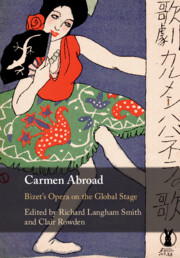Book contents
- Carmen Abroad
- Carmen Abroad
- Copyright page
- Contents
- Figures
- Tables
- Preface
- Acknowledgements
- Notes on Contributors
- Part I Establishment in Paris and the Repertoire
- Part II Across Frontiers
- Part III Localising Carmen
- 17 Russian Carmens and ‘Carmenism’: From Imperial Import to Ideological Benchmark
- 18 The Other Reversed? Japan’s Assimilation of Carmen, 1885 to 1945
- 19 Flamenco and the ‘Hispanicisation’ of Bizet’s Carmen in the Belle Epoque
- 20 Carmen at Home: Between Andalusia and the Basque Provinces, 1845 to 1936
- 21 Carmen in the Midi Amphitheatres: A ‘Tauro-Comique’ Spectacle
- Selected Bibliography
- Index
- References
20 - Carmen at Home: Between Andalusia and the Basque Provinces, 1845 to 1936
from Part III - Localising Carmen
Published online by Cambridge University Press: 18 September 2020
- Carmen Abroad
- Carmen Abroad
- Copyright page
- Contents
- Figures
- Tables
- Preface
- Acknowledgements
- Notes on Contributors
- Part I Establishment in Paris and the Repertoire
- Part II Across Frontiers
- Part III Localising Carmen
- 17 Russian Carmens and ‘Carmenism’: From Imperial Import to Ideological Benchmark
- 18 The Other Reversed? Japan’s Assimilation of Carmen, 1885 to 1945
- 19 Flamenco and the ‘Hispanicisation’ of Bizet’s Carmen in the Belle Epoque
- 20 Carmen at Home: Between Andalusia and the Basque Provinces, 1845 to 1936
- 21 Carmen in the Midi Amphitheatres: A ‘Tauro-Comique’ Spectacle
- Selected Bibliography
- Index
- References
Summary
The opera Carmen has been at the centre of vivid debates on Spanish national identity since its premiere. Praised abroad for its Spanish melodies, Bizet’s work could hardy be taken as authentic in the country where Mérimée set his 1845 novella. This chapter explores the interpretation of the opera by intellectuals and music critics from Andalusia and the Basque provinces, the two most prominent geographical references in the work.
The chapter offers a contextualisation and charts the reception of the opera within the Spanish cultural politics of the period which coincided with the blossoming of peripheral regionalisms, and nuances existing accounts of the opera’s reception in Spain. First it surveys the case of Andalusia, placing the arrival of the opera alongside the assimilation of its culture as the quintessential expression of the nation’s identity. Secondly, it shows Basque reactions to Carmen, which further exemplified the difficulty of consolidating the one-size-fits-all idea of Spanishness that the opera transmitted abroad. The chapter presents a cultural history of the reception of the opera together with a discussion of the cultural politics of the rich web of ethnic identities that constitute modern Spain.
Keywords
- Type
- Chapter
- Information
- Carmen AbroadBizet's Opera on the Global Stage, pp. 320 - 334Publisher: Cambridge University PressPrint publication year: 2020
References
Newspaper and Periodical Literature
Ahora (Madrid)
La Alhambra (Granada)
L’Athenaeum français. Revue universelle de la littérature, de la science et des beaux-arts
La Baskonia (Buenos Aires)
Boletín del Centro Artístico de Granada
Crónica Meridional: diario liberal independiente y de intereses generales (Almería)
Diario de Córdoba de comercio, industria, administración, noticias y avisos
El Defensor de Granada
Euskara (Pamplona)
Le Figaro
Hermes (Bilbao)
La Moda Elegante (Cadiz)
El Nervión (Bilbao)
El País
La Palma: Diario de avisos, mercantil, industrial, agrícola y literario (Cadiz)
Revista Musical (Bilbao)
La Revue des deux mondes



